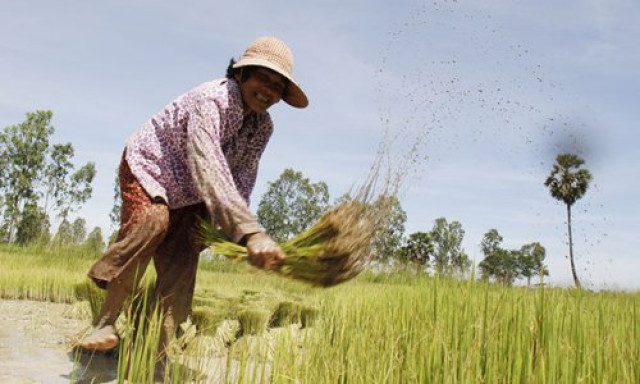The Impact of COVID-19 on Cambodian Farmers

- Boramey Keng and Sokvy Rim
- January 29, 2021 9:47 AM
Agriculture has been one of the main development sectors in Cambodia as it employs 3 million people, equalling one third of Cambodia’s workforce. According to the World Bank, agriculture is the second most important sector of Cambodia’s economy, contributing 20 percent of Cambodia’s Gross Domestic Product (GDP), after the garment sector.
Rice is the main Cambodian agricultural product as 28,413 tons of rice were exported to the international market in 2020. However, the agricultural sector in Cambodia remains weak and fragile due to the lack of irrigation systems and technical skills.
It is relatively low compared to the neighbouring countries like Vietnam and Thailand that have exported 5 to 6 million tons of rice annually. Since most Cambodians in rural areas depend on small-scale farming as the main source of income, the unprecedented outbreak of COVID-19 has presented great challenges for Cambodian farmers. Hence, it is important to examine the Cambodian farmers’ struggle amid the COVID-19 crisis.
Cambodian farmers are facing economic challenges and risks resulting from border restrictions. Even though the United Nations Development Programs (UNDP) has found that the lives of farmers during COVID-19 seem to be less affected by the health impacts, they have been struggling economically.
They have been at risk of falling into debt since they need to take loans from microfinance institutions for their input in agricultural activities. Even worse, processing the loans may be difficult due to the fact that most of them already defaulted on their debts or loans previously given by banks or microfinance institutions. Thus, it would make it easy for them to fall into the debt trap with their properties being confiscated.
According to the World Bank, the majority of Cambodian rural farmers depend on less than 0.5 hectares of land while over 10 percent of them are entirely landless. In fact, Cambodia’s geographical location and climate are very conducive to the agricultural sector; therefore, farmers could produce enough crops to support their families for the whole year if they could do farming twice or thrice a year despite their small plots of lands.
Unfortunately, being ill-equipped with technical skills, the lack of irrigation systems and their relying on traditional practices have prevented farmers from harvesting two or three times a year. Then, to support their families, most farmers have to do extra work in transportation, construction or garment factories.
Even so, due to the COVID-19 impact, border closures and lockdowns have financially affected many companies. Some of them decided to lay off some of their employees, and some have been forced to shut down, leaving thousands of Cambodians jobless. In 2020, around 129 factories closed, which resulted in the loss of around 70,000 jobs and, while 112 companies have been opening, but this could only provide 20,000 jobs on the market. It’s worth noting that this unusual phenomenon has posed a major problem for small-scale farmers who would look for jobs for extra income after their agricultural production. According to the Cambodia Microfinance Association, in 2019, over 2 million Cambodia families had taken bank loans.
As in the mid-pandemic, some families have faced the problem of returning money to the bank. Radio Free Asia (RFA) reported that some farmers were forced to sell their livestock and lands in order to pay their debts. Moreover, a survey conducted in 2020 by Focus on the Global South showed that 29.2 percent of farmers turned to microfinance institutions and commercial banks to borrow money to pay their previous debts during the pandemic.
Furthermore, one should not ignore the fact that the lack of market access and the dramatic price reduction of agricultural products and commodities in Cambodia have been a major challenge for farmers.
Even though Cambodia's rice exports to foreign markets have risen sharply, increasing approximately 32 percent in 2020, small-scale farmers have been facing the difficulty of competing with the illicit flow of vegetables grown with chemicals and the lower prices of meat brought from neighbouring countries. For instance, even with the temporary suspension of imported fish from Vietnam issued by the Ministry of Agriculture, there was still around 17.000 tons of fish imported illegally into Cambodia in 2020, which was higher than in 2019 when only around 12,000 tons had been imported.
This would lead to a significant drop in fish prices, causing farmers to get small profits from selling fish, with some of them not even able to recover the money they had spent on input. In addition, Cambodian farmers tend to grow plants according to favourable conditions for each particular crop, and this is another issue making agricultural product prices drop. As an example, Cabbage is one of the crops that most Cambodia farmers have turned to since last December up until early this year since it is easy to grow and can be harvested quickly.
Consequently, prices have decreased dramatically due to the high supply on the market. It is reported that the price of cabbage, which used to be around 5,000 riels (around $1.25) has declined to a little over 1,000 riels ($0.25). The highest price during this abundance of cabbage season is only 2,000 riels (around $0.50) for farmers who are the members of a project or organization in the field. As a result, some Cambodian farmers have fallen into bankruptcy.
Nonetheless, the efforts of the Cambodian government to support farmers have been noticed and recognized as in early 2020, Prime Minister Hun Sen urged all stakeholders, particularly the Ministry of Agriculture, Forestry, and Fisheries, to pay greater attention to farmers and the agricultural sector to boost agriculture productivity to back up the economy during the crisis. Notably, farmers have been allowed to suspend their payments to micro-institutions. Moreover, the government planned to allocate land to landless farmers so that they can get enough land for agricultural activities. The Ministry of Commerce, the Ministry of Agriculture, and the United Nations Development Programme are cooperating to launch the New National Cassava Policy 2021-2025 aiming to improve the production and export of cash crops known to be a potential area for growth for farmers in Cambodia.
For instance, NGOs and UN agencies also play an important role in supporting farmers in Cambodia. Non-profit Voluntary Service Overseas (VSO) has been working collaboratively with the Ministry of Economy and Finance, the Ministry of Agriculture and the Ministry of Commerce to ease the burden of farmers by linking markets to farmers as well as ensuring the maintenance and improvement of their high-quality products with sustainable farming techniques. Even before COVID-19 hit, VSO had launched a project called Improving Market Access for the Poor (IMA4P), aiming to help the poorest people in the agricultural field.
Remarkably, in 2018 IMA4P had done this by increasing both quality and quantity of rice yield by 39 percent and income by 83 percent per hectare, which had helped farmers plant 70 percent less seeds and reduce planting costs by 30 percent. Additionally, one group of Cambodian young people created the Covid Farmer Hacker project, helping farmers to find customers and look into new farming techniques through social media platforms.
Overall, the pandemic has affected the output, value chain and security of agriculture, causing a significant drop in profits for farmers. Even though the government with relevant ministries as well as people in the community have done some work to ease the burden of farmers, they are still in a rough situation and need help from the government. It can be the reduction of water and electricity prices or debt relief from microfinance institutions to ease their struggle.
Boramey Keng and Sokvy Rim are recent international relations graduates from the Department of International Studies, Royal University of Phnom Penh, Cambodia.















